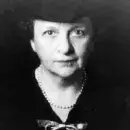
Frances Perkins
Frances Perkins served as U.S. Secretary of Labor from 1933 to 1945. She was the first woman to serve in a presidential cabinet and also the longest-serving cabinet secretary in that position. As labor secretary, she played a key role writing New Deal legislation, including Social Security, unemployment insurance, the federal minimum wage, and federal laws regulating child labor and labor unions.
Born in Boston, she was educated at Mount Holyoke College (B.A., 1902), the University of Pennsylvania Wharton School (1907–1909), and Columbia University (M.A., 1910). In 1907, she became general secretary of the Philadelphia Research and Protective Association and investigated phony employment agencies that preyed on immigrant women. In 1910, she gained attention as head of the New York Consumer’s League, lobbying for better working hours and conditions after the infamous Triangle Shirtwaist Factory fire. This led to her appointment as executive secretary of the city’s Committee on Safety, where she played an instrumental role in creating the New York State Factory Investigating Commission, a legislative panel that inspected factories and other workplaces. In 1919, she was appointed to New York’s State Industrial Commission–one of the first women to serve as a commissioner in the state. In 1929, she was appointed the first Industrial Commissioner of the State of New York.
In addition to her role as labor secretary, she also chaired the President’s Committee on Economic Security, overseeing the reports and hearings that resulted in the Social Security Act of 1935. Because the Immigration Service was within the Department of Labor at that time, Perkins also creatively administered restrictive quota regulations to aid refugees from Nazi persecution in Europe. In 1946, Perkins was named to the United States Civil Service Commission, and used the position to speak out against gender discrimination in the government. In her final years, she was a lecturer at the New York State School of Industrial and Labor Relations at Cornell University.